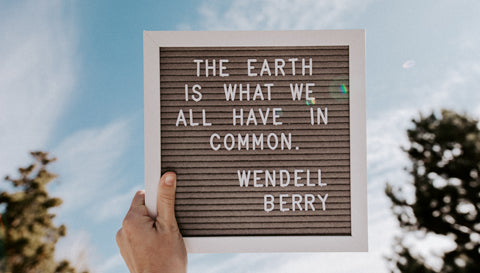Sustainable stewardship is a serious commitment—and it’s also a passionate mission for all of us at Hyperbiotics. True sustainability needs to go far beyond the way our products and practices nurture your microbiome and our planet’s intricate web of life today—we also have to constantly consider how each small decision we make will impact the world long after we’re gone.
Whether it’s our ingredients, manufacturing practices, packaging, or working conditions, the ripple effects from every link in our production chain will be felt for many generations. These choices aren’t always as easy or simple as we had hoped, but we’re treading carefully to take the very best care of our customers and our planet as is humanly possible.
You’ve been asking us some very thoughtful sustainability questions lately, and we’re always happy to keep you in the loop. Here are some of the most frequent environmental questions you’ve asked, along with what we’re doing to make sustainability a priority at every level.
Q. Why do you use conventional plastic bottles—couldn’t you use compostable or biodegradable plastics instead?
A. We were initially so excited about the idea of more earth-friendly plastics. But because our probiotic formulas contain live organisms, we had to be sure this packaging choice could adequately protect those friendly microbes on their journey from our facilities to your gut. Unfortunately, as we explored compostable options like plant-based plastics, we discovered that those eco-friendly materials simply weren’t strong enough to keep probiotic organisms safe from air and moisture—which meant this choice couldn’t be counted on to make sure your probiotics arrived alive and healthy.
We also looked into glass bottles as a possible alternative, but there wasn’t a significant difference in the impact on shelf life—and switching to glass would significantly increase our shipping costs, which would get in the way of our commitment to keep customer prices low.
For the time being, to protect our probiotics while being as gentle as possible to the planet, we decided to go with recyclable BPA-free plastic. It’s our deepest hope that you choose to practice recycling—either through your local recycling center or through participating veterinarians, clinics, or shelters that accept used plastic bottles. But we haven’t accepted plastic as our permanent solution. We’re constantly on the lookout for more earth-friendly ways to package and protect our probiotic formulas.
Q. So is all your packaging recyclable?
A. Every single one of our probiotic formulas as well as our organic prebiotic powder comes in a recyclable bottle. The type of plastic we use (2HDPE) is one of the most widely accepted plastics at recycling centers.
Q. What steps are you taking to reduce waste in landfills?
A. It’s really important to us to generate less garbage, and not to contribute to the massive amounts of waste piling up in landfills. That’s why we don’t use any extra packaging like boxes or leaflets that generally just end up in the trash. Instead, we’ve squeezed every bit of important information onto our labels so the only packaging you receive is our recyclable bottles.
Q. Are you taking any additional steps to lower your carbon footprint?
A. We’re huge believers in offsets to compensate for any unavoidable environmental impact we have. These offsets involve purchasing carbon credits in sustainability projects like forest protection, renewable energy, or water quality.
Because we care so intensely about this planet—and to soften the impact of having to use plastic bottles right now—we’re working through Natural Capital Partners in a carbon offset program by contributing to the Rimba Raya Biodiversity Reserve.
Q. What else are you doing to make this planet a better place?
A. In addition to keeping all our materials and practices as eco-friendly as possible, we’re also paying it forward by taking meaningful steps to restore our planet’s endangered wildlife and ecosystems. That’s why we’ve deepened our involvement with the Rimba Raya Biodiversity Reserve to include more than just carbon offsets. Of the reserve’s many worthy endeavors, we were especially excited to learn that they house the Orangutan Foundation International (OFI), the largest private orangutan sanctuary in the entire world. We’re so proud and happy to now be the foster parents of five of their adorable orangutans: Krista, Cory Marder, Lear, Bayat, and Irvine.
We’re also doing our part to sustain human life by supporting Bumi Sehat, a non-profit Indonesion organization that lovingly provides breastfeeding support, youth and healthcare education, environmental improvements, and disaster relief—along with free prenatal, birth, emergency, and postpartum care to financially challenged families.
We’re committed to making sure every one of our choices serves to help sustain life and good health on this planet for generations to come—and we’ll continue to keep you posted as our sustainability journey evolves. Please feel free to reach out to us anytime and we’ll be happy to let you know what steps we’re taking to protect this world for the grandchildren of your grandchildren.
